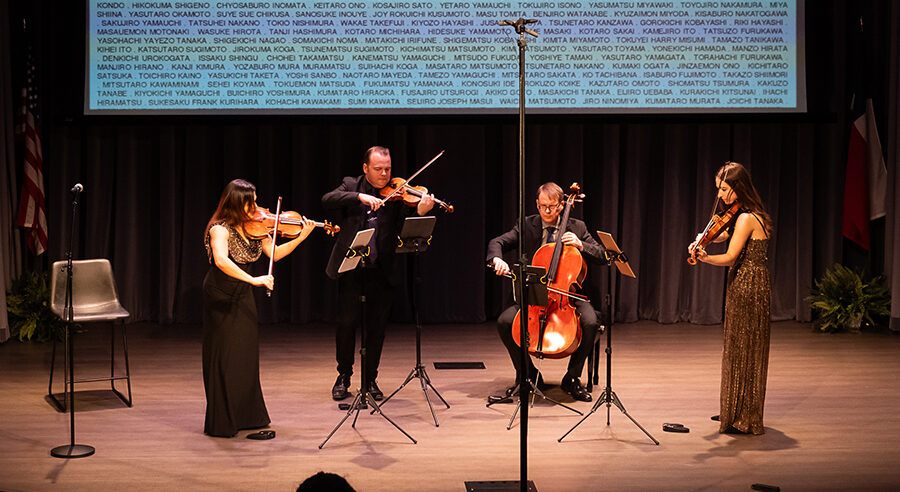Dr. Martin Regan’s ‘The Book Of Names’ To Be Performed in Houston By The Apollo Chamber Players With Narration By George Takei
Dr. Martin Regan will present his musical work “The Book of Names” on Saturday, Oct. 5, at 7 p.m. in Zilkha Hall at The Hobby Center for the Performing Arts in Houston. Regan is a professor in the new Music Performance program that just debuted this semester in the College of Performance, Visualization and Fine Arts.

Dr. Martin Regan will present his musical work “The Book of Names” on Saturday, Oct. 5, at 7 p.m. in Zilkha Hall at The Hobby Center for the Performing Arts in Houston. Regan is a professor in the new Music Performance program that just debuted this semester in the College of Performance, Visualization and Fine Arts.
The composition will be part of a program titled “We the People: Liberty,” produced and performed by the Apollo Chamber Players, who commissioned Regan’s piece. Actor and activist George Takei will provide narration for “The Book of Names.” Tickets start at $39 and can be purchased on the center’s website.
Regan said the piece is a poetic musical statement intended to “evoke the anguish of lost identity” in memory of the Japanese Americans — more than 125,000 — who were incarcerated during World War II. They were removed from their homes and stripped of their belongings, Regan said, being “forced to erase their identity.”
In 2021, the Japanese American National History Museum of Los Angeles compiled a list of names of those who were incarcerated into an exhibition piece titled “Ireichō.” After viewing the list, Regan was inspired to compose “The Book of Names.” In February, the Apollo Chamber Players — Matthew J Detrick, violin; Anabel Ramirez, violin; Aria Cheregosha, viola; and Matthew Dudzik, cello — performed the score at the Holocaust Museum in Houston.
“The work begins quietly and pensively, but slowly becomes more chromatic, dissonant and builds in intensity to an agonizing climax,” Regan said. “And in this moment of silence, the performers begin to recite from ‘The Book of Names,’ offering a spoken tapestry that is woven into the musical texture. The piece ends quietly with a sense of introspection and gravitas.”
Following the performance, Regan said he was approached by an elderly Japanese American woman who recognized the names of family members and friends in a video projected on a screen behind the ensemble during the performance. After a successful premiere, Reagan said the Apollo Chamber Players became interested in reprogramming the work in a revised version with narration. They contacted Takei, known for the “Star Trek” television show and films and other roles. Takei was incarcerated with his family at 5 years old.
Takei wrote a narrative about his experience for “The Book of Names,” and will present his story for the performance. According to Takei’s website, he spent most of his childhood at Camp Rohwer in Arkansas and Camp Tule Lake in California. At the end of World War II, his family returned to their home in Los Angeles.
The narrative is personal, Regan said, as Takei shares what it was like before he entered the camps, what he learned from his parents about democracy and living a life of integrity.
“He provides an opportunity for listeners to hear his story and take a moment to consider why the American government would have done this to American citizens,” Regan said. “In the end he tries to examine it in a positive light and provide a model for what we can learn from our experiences.”
An excerpt from Takei’s narration reads: “Our democracy is a precious ideal that requires all of us, as Americans, to actively engage with it to keep it strong and true and shining.”
Regan said the quote is the moral of the story: Takei and his family suffered, but through it all, they showed strength over adversity.
“George has dedicated his life as an activist to try to keep his memories alive so that nothing like this happens again,” Regan said. “I think the text reflects his dedication to the project and what he wishes to transmit to those who will attend the performance.”
Regan said he is honored Takei wrote his account for the piece, knowing it was worthwhile for him to share his story. As the audience listens and reflects on this “dark period in American history,” Regan said, he hopes they are reminded to honor the memory of those who suffered.
“We make pilgrimages to see physical monuments because we believe there is value in not forgetting tragedy,” Regan said. “My piece is like a sonic monument — instead of taking up physical space, it takes up time. But the impact should be the same — after you experience this it may prevent you from forgetting.”